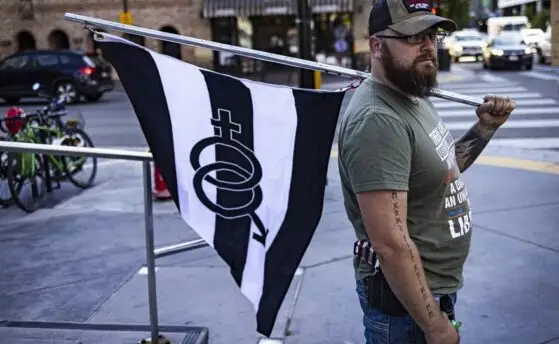
HOGANSVILLE, Ga. — For years, this small town nestled in the pine forests off Interstate 85 has struggled to keep its police department financially afloat. But the town is riding high these days on a $2.4 million windfall, thanks to drug dealers who happened to be passing through.
A police officer, aided by a drug-sniffing German shepherd named Bella, parks his cruiser on the side of the expressway three or four days a week, looking for any vehicle that seems suspicious — a broken taillight, an expired license plate or simply a car that changes lanes excessively.
…a car with three or more Latinos in it, an expensive car driven by a black man, a car that drives funny when a cop is tailing it for a mile or two…
No arrest is necessary for forfeitures of more than $5,000, as long as the money can be linked to drug activity, said Agent Bill Grant, a DEA spokesman in Washington.
That’s right! If you’re travelling with more than $5,000 in cash, cops can just take it, say it’s drug money, and send you on your way without any charges being filed. Moreover, if you want your money back, you have to prove it was “innocent”. The police never have to prove it was actually “guilty” of being drug money. Why, the fact that someone is carrying more than $5,000 in cash proves that it was drug money.
The city is not ashamed to let people know the source of its newfound wealth. Rear bumpers of the police cruisers advertise that the cars were purchased with seized money.
In two years since the program began, the department has supplemented its $630,000 annual budget with $2.2 million in cash and $200,000 worth of vehicles, including a Range Rover, pickups and cars that were auctioned.
So, what you’ve got then are police departments that are motivated to make drug arrests because of the potential profit. Shouldn’t police be solving crimes and protecting the people based on public need, not police greed? Would cops be more likely to solve murders if the families offered a few hundred grand as a tip?
Now, Russ, you think, what’s wrong with our good honest police departments getting much-needed equipment from the ill-gotten loot forfeited by scumbag drug dealers? Whatever hurts the drug dealer and helps the cops is good, right? Why not hit ’em in the pocketbook? Why do you hate America so much?
Well, it’s because the very act of asset forfeiture turns good, honest cops into bad, corrupt cops, and it’s not always scumbag drug dealers who get caught up in asset forfeiture. From the website of The Forfeiture Endangers American Rights (FEAR) Foundation
What was not considered … was the fact that shifting the lure of assets from criminals to the police would tend to corrupt the police — and that it would shift law enforcement priorities away from apprehending violent criminals and toward the more lucrative pursuits of civil forfeiture for drug offenses.
In other words, busting the middle-class guy with a joint is motivated by the profit from auctioning his sports car. Busting poor violent troublemakers in the inner city; not so much profit there.
Starting in 1984, federal police began a program began called “Equitable Sharing” or “Federal Adoption,” which allowed the federal police to recruit state and local police to work for them in seizing property under federal statutes. Under this law, local or state police could seize property — even if the seizure was invalid under state law — and turn it over to the federal government for forfeiture under a federal statute. If the federal forfeiture case was resolved favorably to the police, the feds would split the proceeds with the local cops — even if the forfeiture would have been totally illegal under state law, and even if their motivation in going federal was only to evade state law.
Funny how when it comes to helping local cops break state laws, the feds are happy to help, and when it comes to local patients following state medical marijuana laws, the feds are happy to bust ’em. States’ rights my ass!
F.E.A.R. member Jim Spurlock, owner of an aircraft sales company in Texas, saw two of his customers’ airplanes seized by Customs. The first, a Lear Jet, was seized In January 1992 because of a tip from an informant,(4) that the airplane, which was headed for its new home in Brazil, would be carrying a large sum of money. Customs agents searched the airplane and did not find any money, nor were they able to find any other evidence of wrongdoing that would corroborate the informant’s tip, but Customs seized the plane anyway. Meanwhile, they checked all the paperwork submitted to the Federal Aviation Administration regarding the plane and found a mistake on a form. To describe the owner of the plane, they had checked the box “corporation” instead of “foreign corporation.” The FAA’s standard response to such as mistake is to require the paperwork to be corrected.
Customs also checked the paperwork submitted on all of Mr. Spurlock’s other airplane sales, and found one other paperwork mistake, again a “technical” mistake, and in April 1992, seized a plane purchased by another customer.
After detaining the airplanes several months — the Lear jet 7 months, and the other plane 4 months, the government agreed to give them back after the customers paid “impoundment fees” — the “fee” for the Lear jet being over $16,000. This is in addition to substantial investments made by Mr. Spurlock’s customers in attorneys fees incurred in getting the planes released. Also, there was damage done to the planes during the period of their detention which cost more money to cure.
Another F.E.A.R. member had his $1.5 million yacht seized because his captain had failed to declare some fish he was bringing back to donate to a public aquarium. Our member is a noted philanthropist who over the years has contributed substantial sums, as well as marine specimens to the aquarium, among other philanthropic endeavors. He was not on board his yacht when the seizure occurred. Customs agents had boarded the boat and were looking at the fish in the tank when the customs agent asked the captain “what do you have to declare?” The captain said “nothing”, thinking that he did not have to “declare” fish. There was no reason the captain would want to “smuggle” the fish into the country, since they were to be given away to a public charity. After months of seizure, the owner bought back his yacht.
What legitimate law enforcement purpose do these seizures serve? Are they really removing the means to commit another similar offense? If so, what is the government trying to deter in the case of the fish — philanthropy?
Technical violations, such as the FAA paperwork “errors,” now gives the government the power to extort $16,000 from an airplane owner, without even having to go to court, or make any showing that the government had a case that justified forfeiture as a punishment. What purpose does this seizure serve?
To adequately fund police departments without politically unpopular tax hikes?
An investigative report released in August 1992 by Representative John Conyers, Chairman of the House Government Operations Committee, revealed that, in the prior two years, the Justice Department spent $28.6 million on informants. Sixty five Justice Department informants [snitches] were paid more than $100,000 a year, about two dozen made between $100,000 and $250,000, and eight made over $250,000. The highest paid informant made $780,000 in one year. Customs also has the authority, and its own slush fund to purchase the testimony of informants to support forfeiture seizures.
These informants are paid under provisions in the forfeiture laws that allow the government to pay up to 25% of the value of forfeited property to informants whose information is used to forfeit the property.
Informants are typically not normal, hard-working, law abiding citizens making an honest living. These informants are, for the most part, criminals with extensive records. Often informants are recruited when they themselves are arrested for drug trafficking and other serious crimes, and offer to “rat on” other people in exchange for getting their own charges reduced or dismissed. They may also be offered 25% of the forfeiture “take” in addition to reduced punishment in their own cases.
Thus, paid informants have a strong incentive to lie.
But informants would only lie about other bad guys, right? There’s no way they’d trump up charges against a low-level offender or a perfectly innocent person in exchange for freedom and a six-figure payday. Snitches have the highest of morals when it comes to that.
Finally, you might ask how much effect has “hitting them in the pocketbook” had on the drug kingpins? Well, just like almost every other drug war policy, there is no requirement for actual, measurable success. Drugs cost less and are more available than ever. Drug deaths have remained about the same. Arrests and forfeitures have risen with no corresponding drop in drug trade. Lucrative criminal markets and drug kingpins still reign over their black markets. It doesn’t achieve its stated objective. No prohibitionist policy does.
There are so many horror stories of innocent people whose lives have been devastated by aseet forfeiture and the cops who stand to profit from it. Here’s just one, the story of Nancy Wall, but you can find many others:
I want to introduce you to Nancy Wall, whose entire family has been hit hard by the drug war. Like millions of American citizens, she has been abused by bad laws and their enforcers.
This lady, Nancy Wall, is one of the best/worst examples I know of abuse of forfeiture laws. Her husband and son were forced to plea bargain with no drugs in evidence. Both are serving 12 years each (I think they are in their seventh year) on marijuana charges because the ‘law’ threatened to put mom in jail for 20 years.
While the 15 or 20 law officers from the DEA on down were ransacking their home at six a.m., as usual on the word of a friend turned snitch, they were dropping Nancy’s jewelry in their pocket. A plaque from her home still hangs in the local DEA agent’s office. Even after the bust, they made her deliver a television that was not in her house at the time of the raid to the DEA office downtown, to go with the VCR they took from her home.
They stole her house and put it up for sale. Her sister-in-law bought it back for her, and that made the DEA so mad, so they sent the IRS in. The IRS now has a $45,000 lien on her home for ‘unreported drug money.’ Every once in awhile, they still call her down to shake her upside down for spare change.
During the arrest, the cops and agents pillaged and plundered, screamed, threw Mr. and Mrs. Wall around and pointed guns in their faces. Believe me, the arrest of non-violent people seems to be a training ground for bullies in situations when the law’s “right” to commit violence is uncalled for.
They put a monitor on her ankle for six months, forced her to serve five years probation, and she wouldn’t dream of doing any drug her doctor doesn’t give her. They ripped off her bank account containing severance pay from N.A.S.A., where she had worked for 25-30 years. She had proof that the money was not drug money, but they didn’t care. They had $$$$$ signs in their eyes.
The Walls are in their sixties, their son in his 40s. None have ever crossed paths with the law before. Nancy, like I say, had worked many years for N.A.S.A. Her husband, Jim, retired from the military after a long career and distinguished career, and her son, Jeff, was middle class America. Nancy and Jim have been married for 46 years and she’s having a hard time holding on. She put off extensive hip surgery for as long as she could, hoping to wait till her family was home to help her. Last fall she finally was forced to have the surgery alone.
The day after they put the electronic monitor on her, she went to N.A.S.A. and the people she worked with were lined up to hug her, some crying. The Walls were valuable assets to friends, neighbors and co-workers. They were paying their way, helping others, pursuing life, and now the whole family is just a statistic.
All over America, people are losing respect for those who make the laws, as well as those who enforce them. This excuse, “We’re just doing our job” is an outright lie. Too many of them are enjoying their job, relishing their job, and making profits off the perversion of their jobs. Little silver-haired Nancy, every time a cop passes, whispers angrily, “I just hate those bastards.” Can you blame her?
No, I can’t. Forfeiture corrupts cops, hurts Americans, does nothing to stem drug trade or crime. It’s an abomination.






